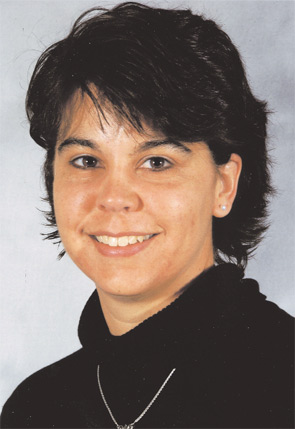
With many professions, getting that initial experience in an area of expertise is the hardest part of building a career. Kelli Dominick Allen, PhD, can testify that this holds true for new research scientists, or junior investigators.
“So often, it can be hard for junior investigators to secure adequate funding, particularly as a principal investigator on their first grant,” states Dr. Allen, who is building her career in rheumatology research at Durham VA Medical Center (N.C.). “Until you get that first big research project under your belt and solid experience as a lead investigator, funding can be difficult. But you often can’t get that kind of experience without initial funding opportunities.”
Dr. Allen’s ACR REF Health Professional New Investigator Award was a major turning point in her career. “Although I had a lot of previous research experience, most of that time was spent assisting already established projects as a co-investigator,” she says. “The REF gave me my first major opportunity as a lead investigator, and that experience will have such a positive effect on my research career.”
With a background in exercise physiology, Dr. Allen was first exposed to rheumatology at Duke University Medical Center, after completing her master’s at Wake Forest University. At Duke she worked on clinical trials evaluating the effects of physical activity on chronic conditions, including osteoarthritis and fibromyalgia. “While working on these clinical trials, I really developed an interest in the rheumatic diseases … perhaps because the rheumatic conditions often had fewer treatment options and because of the impact of pain on daily living,” says Dr. Allen. “There seemed to be a real need for improved pain management techniques, and I saw that as a real opportunity to blend my background in exercise physiology with a new course of research in arthritis pain management.”
Dr. Allen earned her PhD in Biobehavioral Health at Penn State University, and continued to participate in research projects focused on arthritis pain and pain management. Many of those projects concentrated on osteoarthritis. With several years of experience as a research assistant and co-investigator, she was eager to launch her own project as a lead investigator.
She was excited to learn about the ACR REF Health Professional New Investigator Award, a newly developed award program that provides significant research funding to junior investigators with limited prior research experience. “This award was really geared toward the junior investigator like very few other awards I’d seen,” says Dr. Allen. “The REF didn’t have stringent requirements about previous funding to qualify for this award, nor did they have stipulations about previous lead investigator experience as a criterion for selection. Basically, the award was custom-tailored for the junior investigator looking to become a lead researcher.”
Dr. Allen applied for and received the award in 2005. With her REF award funding, she was able to lead her own research project to study pain self-assessment among patients with osteoarthritis in an attempt to better understand patterns of pain variation and identify possible influences on pain variation, such as site of pain, gender, or race. Now in her second year of the project, Dr. Allen is pleased with the volume of data she has gathered through patients’ self reporting using personal digital assistants (PDAs), and she looks forward to reviewing and analyzing her findings in the coming months.
“I think using PDA devices may be an important complementary approach to traditional pain assessment tools that rely on pain recall, since use of PDAs allows information to be captured in the moment, as opposed to hours, or even days, later,” comments Dr. Allen. “We also hope that patients using these devices may develop a better understanding of what may trigger or prolong their bouts of pain, and that they will be able to more effectively communicate with their physicians about these issues. Thinking long-term and larger-scale, this process for pain assessment has the potential to be very useful in other clinical and research trials. It could also conceivably be adapted to an online system that would translate to clinical practice.”
Of her award experience, Dr. Allen says, “The whole process, while entailing a lot of work and effort, has been really fun and rewarding. The return on my investment of time has been absolutely invaluable. I now have experience leading my own research project—and that opens so many new doors for me.”
The ACR REF Health Professional New Investigator Award is part of the REF’s extensive awards and grants portfolio. It encourages health professionals new to rheumatology to pursue rheumatology research careers by supporting a structured research project.
Health Professional Awards

The REF offers an extensive awards program with research and education opportunities for all facets of the rheumatology profession, including awards specifically for health professionals. In addition to the ACR REF Health Professional New Investigator Award that Dr. Allen received, the REF also offers the following awards for the health professional community:
- ACR REF Health Professional Investigator Award: Provides research support to health professionals pursuing careers in rheumatology-related research;
- ACR REF Lawren H. Daltroy Fellowship in Patient-Clinician Communication: Supports research that will lead to improved patient-clinician interaction; and
- Academic Reentry Award: Assists fully trained re-search scientists in resuming rheumatology careers after taking a hiatus for personal or family reasons.
Application materials for these awards will be available in May, and applications are due on August 1, 2007. For more information, visit www.refawards.org.

